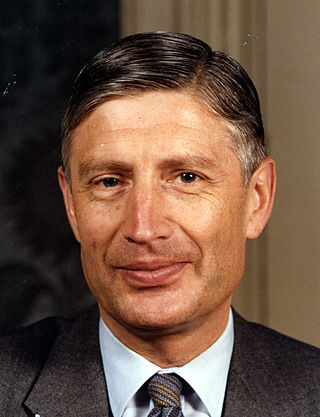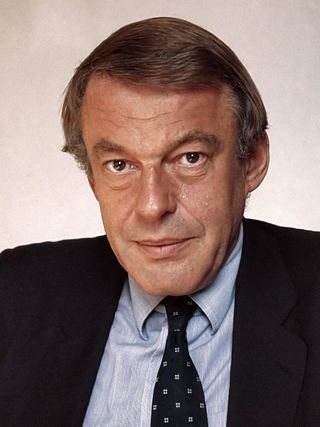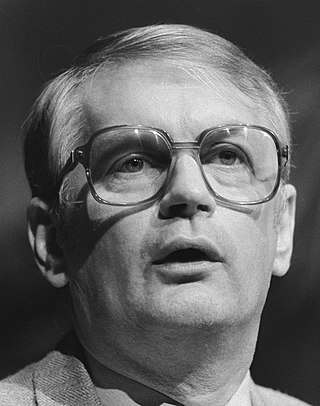Political career
In 1953 Den Uyl was elected to the municipal council of Amsterdam and in 1956 he was elected to the House of Representatives. In 1963 he became municipal administrator for economic affairs in Amsterdam, resigning his parliamentary seat. He resigned that post in 1965 to become Minister of Economic Affairs in the Cals cabinet. As the responsible minister, he decided to close the uneconomic coal mines in Limburg, causing high local unemployment. Following the parliamentary elections of 1967, he became leader of the Labour Party in parliament.
Den Uyl's Labour Party won the 1972 election in alliance with the progressive liberal Democrats 66 and radical Christian Political Party of Radicals, but failed to achieve a majority in parliament. After lengthy negotiations, he formed Den Uyl cabinet with the Christian democratic Catholic People's Party and Anti-Revolutionary Party. This cabinet faced many problems. An early problem was the 1973 oil boycott following the Dutch support of Israel in the Yom Kippur war. Den Uyl said in a speech on national television that "things would never return to the way they were" and implemented fuel rationing and a ban on Sunday driving.
Between 1973 and 1977, the country's economic situation turned ugly. The government's budget deficit increased tenfold, inflation approached 10 percent, the unemployment rate doubled, and the current account went from positive to negative – the latter a critical problem in a country that rises or falls on foreign trade. Despite economic difficulties, however, real incomes grew from 1973-1977. According to a 1978 budget memorandum, the real disposable income of the “modal worker” (a statistical concept, as noted by one study, ‘similar to the OECD's "average production worker" but at a somewhat lower level of earnings’) went up by 10.3%, for minimum wage earners by 17.8%, and retired people by 27.3%. [10] The government also enacted a wide range of progressive social reforms, such as significant increases in welfare payments, the indexation of benefits and the minimum wage to contractual private sector wage developments [11] and a system of rent rebates (1975), [12] Kindergartens and primary schools with high percentages of children from lower income families were provided with extra facilities (including more money and teachers) and cooperation was stimulated between schools and social and cultural institutions. In addition, 3 local compensatory education and family involvement projects that had been initiated in the early Seventies in Utrecht, Rotterdam and Amsterdam were subsidized by the Ministry of Education under the terms of a new educational development policy. [13] The Primary Education Act of October 1974 gave more freedom to school heads regarding the programming of the curriculum, and an Act of June 1974 made supplementary benefits available to unemployed persons who accepted lower paid- work, with those over 45 receiving supplements "amounting to 100% of their former wage during the first six months; 95% in the next six months, and 85% during the second, third and fourth year; those under 45 receive supplements amounting to 90% during six months, 85% during the next two years." In addition, a law of June 1976 enabled employees aged sixty, two years after the first date of receipt of benefits (WWV scheme), to continue receiving them until the age of sixty-five. The purpose of this legislation was to improve the financial circumstances of older employees who are unemployed for a long time. [14] In August 1976, job protection was introduced during pregnancy and for 12 weeks following childbirth. [15] The number of years of full compulsory education were increased, [16] and an Act on equal pay in the private sector was introduced. [17] In addition, investments were carried out in social services, such as home care services for families. [18]
In 1975, a rent readjustment grant was adopted “to assist households that were capable and desirous of living in better accommodations, but who were intimidated by the sudden increase in rent and the burden of moving costs.” Various types of tenants were eligible, such as those leaving a slum dwelling for a higher rent unit (“slum clearance”). [19] From 1 January 1975, the elderly “who rely solely or almost exclusively on the AOW pension have been granted an additional reduction of NLG 18 per month on the premium for health insurance for the elderly.” [20] Also, with retroactive effect from 1 July 1975, “a new regulation for relocation and refurbishment costs applies to elderly people who want to move from a cheaper to a more expensive home.” [21] In 1975 the social assistance standard was again structurally increased for incomplete families. In 1974 and 1975, the social assistance standards structurally increased more than the net minimum wage. [22] In 1975, national legislation was introduced for residential homes (previously, homes for the elderly had been a responsibility of local authorities). [23]
Taking into account the fact that the dilapidation of private (rental) homes can seriously impede the efficient implementation of urban renewal plans, a regulation was drawn up at the end of 1976 in connection with this “that provides for the granting of financial support to municipalities and approved institutions when they purchase homes from private individuals with the aim of providing the residents of such homes with a reasonable level of living enjoyment for a considerable period of time after a major improvement. For larger municipalities in particular, this aid measure can be an incentive to purchase homes from private owners.” [24] From 1976 onwards, “schemes have been in place under which grants have been provided for the adaptation of accommodation for the disabled.” [25] In 1976, a separate subsidy scheme was introduced for young single persons. [26] In 1976, a law provided a cash benefit equal to the old-age benefit for disabled heads of families (including the unemployed and self-employed) and disabled single persons aged 17 and over, including those disabled since childhood. Previously, only employed persons for eligible for these benefits. The same law provided for rehabilitation benefits for homemakers. [27] This law also provided for special transport, retraining and reimbursement of extra expenditures incurred as a result of handicaps “on the condition that these services are not provided by other social security legislation.” [28]
A regulation was introduced in September 1973 providing for the employment of persons "for whom it is difficult to find employment and who have been in prolonged unemployment." [29] In January 1974, a statutory minimum wage for young people between the ages of 15 and 22 was introduced, and in March 1974 the insurance scheme for wage and salary earners was extended to cover the costs of physiotherapy treatment "where this has been prescribed by a doctor." [30] Under a decree of 19 July 1974 unemployed civil servants and their survivors were entitled to certain benefits. [31] The National Standardization Decree of 3 July 1974 provided rules for the provision of assistance for generally necessary subsistence costs. [32] According to one report "In 1974 the National Assistance Decree came into effect. A social minimum now applied to various types of households: a standard amount that was considered sufficient to cover the general necessary costs of existence." [33] The decree established general rules for the determination of the social assistance level. Net benefits according to the ABW (Public Assistance Act) were fixed at 100 % of the net minimum wage for a married worker aged 23 and elder, and the minimum benefits for breadwinners in the social insurance schemes were finally equalized to minimal wage in 1975. [34] As a result of this decree, “the basic standard of social assistance benefit for a couple without children became equal to the net minimum wage of the married employee without children.” [35] According to one study "The National Standards Decree (BLN) from 1974 was of great importance. In addition to the fact that the BLN contains rules for determining assistance with the general necessary costs of existence, it also meant that the level of benefits was raised to the level of the legal minimum wage. The BLN severely limited the policy freedom of municipalities in the implementation of the law. Nevertheless, there remained uncertainty about the interpretation of the concept of general subsistence costs. The BLN only contains a general description, namely: the costs that cannot be regarded as special necessary subsistence costs determined by individual circumstances." [36] In 1974 the AOW was linked to the minimum wage and therefore became welfare-fixed. [37] After the ABW (Public Assistance Act) was linked to the minimum wage in 1974 lone parents were allowed to keep about a third of their earnings in addition to the benefit, up to a maximum of 25% of the minimum wage. [38] In 1974, the holiday allowance became part of the national standardization and was therefore included in the National Standardization Decree. [39] As noted by one study, "The fixed minimum wage could best serve as a guideline for this. That goal was definitively achieved in 1974: social assistance benefits, the AOW, the widow's benefit and the basic benefits of the Sickness Benefits Act, WAO, WW, WWV all amount to one hundred percent of the net minimum wage, around a thousand guilders per year." [40] Also, as noted by another study, "Partly under the influence of the increase in unemployment since the oil crisis of 1973, a hardship clause was added to the Social Security Act in July 1974 through a change in the National Standards Decree. As a result, you can claim benefits without your entire baptismal certificate being examined by social work. From 1975, everyone from the age of sixteen without a fixed income is entitled to a social assistance benefit." [41] A modest amount of money was released for self-employed persons as an old-age provision through the National Group Regulation on the release of old-age provision for special groups (Stb. 1974, 825). As noted by one study, the National Group Scheme for the release of old-age provision for special groups (Stb. 1974, 825) “envisaged exemption from (part of) the assets of a former self-employed person in the means test for social assistance.” [42]
In September 1975, a regulation on the promotion of vocational training for young people was introduced, aimed at "a great number of young people who, as a result of the present educational system, depend on on-the-job training within the framework of the Apprenticeship Law." The chances of obtaining an individual rent subsidy were also significantly increased, while an Act of June 1975 amended a number of existing Acts "with a view to introducing changes regarding the organisation and the districts of factory inspection and the inspection of ports and dangerous machinery,” and also conferred legislative powers on the Minister of Social Affairs under the Act "concerning the loading and unloading of ocean-going vessels and extended the scope of the Silicosis Act." [43] Early retirement measures were also implemented, [44] with the Den Yyl government being the first administration to do this. [45]
The Collective Redundancy (Notification) Act of 1976 imposed an obligation on employers (who intend to collectively dismiss employees) "to give written notice of this intention to the relevant trade unions for consultation," [46] while that same year consultative works councils were replaced by powerful ones modelled after the German works councils. [47] Also in 1976, a law was passed forbidding dismissal upon pregnancy or marriage for all women. [48] In 1976, a Criminal Injuries Compensation fund was set up. [49] Extra money was also spent on urban renewal, while the arrangement “that allows tenants to get used to a higher rent for a renovated home has been improved.” Various measures were undertaken in the field of road safety, such as compulsory moped helmets and seat belts and the establishment of an alcohol test (breath test). Subsidies were also granted to experiments with Bureaus for Legal Aid. [50]
A February 1976 regulation on accidents in nuclear installations provided for interministerial coordination on measures to be taken "in the event of accidents and for the preparation of an emergency plan." [51] A law of December 1976 relaxed the conditions for exemption from national insurance contributions or entitlement to pay reduced contributions, and also extended entitlement to orphans' pensions "to illegitimate children whose mothers are dead and who have not been recognised by their fathers." The Asbestos Decree of April 1977 prohibited the storage and use of crocidolite (blue asbestos) and materials or products containing crocidolite and also prohibited "the spraying of asbestos or materials or products containing asbestos and their use for thermal insulation or for acoustic, preservative or decorative purposes." In September 1977, regulations were issued "regarding the conditions under which young persons of 16 and over may exceptionally drive agricultural tractors." In May 1977, a subsidy scheme for the placing of handicapped persons was introduced. [52]
In 1977, the Den Uyl cabinet fell due to a conflict between Den Uyl and the Catholic People's Party Minister of Justice Dries van Agt. The Labour Party entered the subsequent election under the banner "Vote for the Prime Minister". The Labour Party won by a landslide, receiving over 33% percent of the votes, a relatively large share in the divided politics of the Netherlands at that time, and 53 seats. Labour's coalition partner Democrats 66 also made gains, from 6 to 8 seats. However, its other coalition partner, the Political Party of Radicals, lost nearly all its seats, making it impossible for Den Uyl to form a new government that he could count on to support him in parliament. More than 200 days after the election, the Christian Democratic Appeal (a new party that was formed by Den Uyl's former coalition partners, the Catholic People's Party and the Anti-Revolutionary Party, joined by the smaller Christian Historical Union) formed a cabinet with the liberal People's Party for Freedom and Democracy, supported by a small majority of 77 seats (out of a total of 150).
After being opposition leader from 1977 to 1981, Den Uyl returned to government in 1981. The Labour Party formed a coalition with the Christian Democratic Appeal and the Democrats 66. Den Uyl became Deputy Prime Minister and Minister for Social Affairs and Employment. Van Agt, by now Den Uyl's nemesis, led this cabinet. The cabinet was in constant internal conflict and fell after eight months. The Labour Party won the snap election of 1982, but could not agree on a new coalition with the Christian Democratic Appeal. As a result, Den Uyl returned to parliament and led the Labour Party in opposition until 1986. As leader of the main opposition party, Den Uyl, always a soft-spoken Atlanticist, provided cover for the government's controversial decision to place NATO cruise missiles on Dutch soil. In turn, this decision, and a similar one by the Belgian government, satisfied one of the West German conditions for the placement of cruise missiles and Pershing II missiles in West Germany.


























